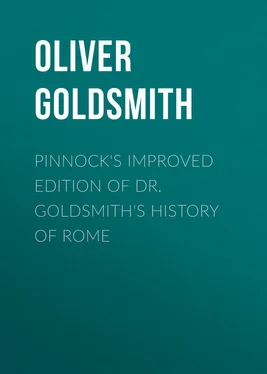Oliver Goldsmith - Pinnock's improved edition of Dr. Goldsmith's History of Rome
Здесь есть возможность читать онлайн «Oliver Goldsmith - Pinnock's improved edition of Dr. Goldsmith's History of Rome» — ознакомительный отрывок электронной книги совершенно бесплатно, а после прочтения отрывка купить полную версию. В некоторых случаях можно слушать аудио, скачать через торрент в формате fb2 и присутствует краткое содержание. Издательство: Иностранный паблик, Жанр: foreign_antique, foreign_prose, на английском языке. Описание произведения, (предисловие) а так же отзывы посетителей доступны на портале библиотеки ЛибКат.
- Название:Pinnock's improved edition of Dr. Goldsmith's History of Rome
- Автор:
- Издательство:Иностранный паблик
- Жанр:
- Год:неизвестен
- ISBN:нет данных
- Рейтинг книги:4 / 5. Голосов: 1
-
Избранное:Добавить в избранное
- Отзывы:
-
Ваша оценка:
- 80
- 1
- 2
- 3
- 4
- 5
Pinnock's improved edition of Dr. Goldsmith's History of Rome: краткое содержание, описание и аннотация
Предлагаем к чтению аннотацию, описание, краткое содержание или предисловие (зависит от того, что написал сам автор книги «Pinnock's improved edition of Dr. Goldsmith's History of Rome»). Если вы не нашли необходимую информацию о книге — напишите в комментариях, мы постараемся отыскать её.
Pinnock's improved edition of Dr. Goldsmith's History of Rome — читать онлайн ознакомительный отрывок
Ниже представлен текст книги, разбитый по страницам. Система сохранения места последней прочитанной страницы, позволяет с удобством читать онлайн бесплатно книгу «Pinnock's improved edition of Dr. Goldsmith's History of Rome», без необходимости каждый раз заново искать на чём Вы остановились. Поставьте закладку, и сможете в любой момент перейти на страницу, на которой закончили чтение.
Интервал:
Закладка:
22. In the early part of the struggle between the patricians and plebeians, the magistracy, named the censorship, was instituted. The censors were designed at first merely to preside over the taking of the census, but they afterwards obtained the power of punishing, by a deprivation of civil rights, those who were guilty of any flagrant immorality. The patricians retained exclusive possession of the censorship, long after the consulship had been opened to the plebeians.
23. The senate, 36 36 The senators were called conscript fathers, (patres conscripti,) either from their being enrolled on the censor's list, or more probably from the addition made to their numbers after the expulsion of the kings, in order to supply the places of those who had been murdered by Tarquin. The new senators were at first called conscript, and in the process of time the name was extended to the entire body.
which had been originally a patrician council, was gradually opened to the plebeians; when the free constitution was perfected, every person possessing a competent fortune that had held a superior magistracy, was enrolled as a senator at the census immediately succeeding the termination of his office.
Questions for Examination .
1. What is the most probable account given of the origin of the distinction between the patricians and the plebeians at Rome?
2. How did Romulus subdivide the Roman tribes?
3. By what regulations were the gentes governed?
4. Who were the chiefs of the gentes?
5. What was the condition of the clients?
6. By whom were alterations made in the number and constitution of the senate?
7. What assembly was peculiar to the patricians?
8. What were the powers of the Roman kings?
9. What great change was made in the Roman constitution by Servius Tullius?
10. For what purpose was the census instituted?
11. How were votes taken in the comitia centuriata?
12. Were the designs of Servius frustrated?
13. What was the Roman law respecting debtors?
14. When did the Roman power decline?
15. What changes were made in the constitution of the equestrian rank?
16. What change was made after the abolition of royalty?
17. How were the liberties of the people secured?
18. Why was the office of dictator appointed?
19. How did the plebeians obtain the protection of magistrates chosen from their own order?
20. What additional triumphs were obtained by the plebeians?
21. What was the consequence of the establishment of freedom?
22. For what purpose was the censorship instituted?
23. What change took place in the constitution of the senate?
CHAPTER V.
THE ROMAN TENURE OF LAND – COLONIAL GOVERNMENT
Each rules his race, his neighbour not his care,
Heedless of others, to his own severe. — Homer .
[As this chapter is principally designed for advanced students, it has not been thought necessary to add questions for examination.
The contests respecting agrarian laws occupy so large a space in Roman history, and are so liable to be misunderstood, that it is necessary to explain their origin at some length. According to an almost universal custom, the right of conquest was supposed to involve the property of the land. Thus the Normans who assisted William I. were supposed to have obtained a right to the possessions of the Saxons; and in a later age, the Irish princes, whose estates were not confirmed by a direct grant from the English crown, were exposed to forfeiture when legally summoned to prove their titles. The extensive acquisitions made by the Romans, were either formed into extensive national domains, or divided into small lots among the poorer classes. The usufruct of the domains was monopolized by the patricians who rented them from the state; the smaller lots were assigned to the plebeians, subject to a tax called tribute, but not to rent. An agrarian law was a proposal to make an assignment of portions of the public lands to the people, and to limit the quantity of national land that could be farmed by any particular patrician. 37 37 The Licinian law provided that no one should rent at a time more than 500 acres of public land. The league by which the Latin states were bound (jus Latii) was more favourable than that granted to the other Italians (jus Italicum.)
Such a law may have been frequently impolitic, because it may have disturbed ancient possessions, but it could never have been unjust; for the property of the land was absolutely fixed in the state. The lands held by the patricians, being divided into extensive tracts, were principally used for pasturage; the small lots assigned to the plebeians were, of necessity, devoted to agriculture. Hence arose the first great cause of hostility between the two orders; the patricians were naturally eager to extend their possessions in the public domains, which enabled them to provide for their numerous clients, and in remote districts they frequently wrested the estates from the free proprietors in their neighbourhood; the plebeians, on the other hand, deemed that they had the best right to the land purchased by their blood, and saw with just indignation, the fruits of victory monopolized by a single order in the state. The tribute paid by the plebeians increased this hardship, for it was a land-tax levied on estates, and consequently fell most heavily on the smaller proprietors; indeed, in many cases, the possessors of the national domains paid nothing.
From all this it is evident that an agrarian law only removed tenants who held from the state at will, and did not in any case interfere with the sacred right of property; but it is also plain that such a change must have been frequently inconvenient to the individual in possession. It also appears, that had not agrarian laws been introduced, the great body of the plebeians would have become the clients of the patricians, and the form of government would have been a complete oligarchy.
The chief means to which the Romans, even from the earliest ages, had recourse for securing their conquests, and at the same time relieving the poorer classes of citizens, was the establishment of colonies in the conquered states. The new citizens formed a kind of garrison, and were held together by a constitution formed on the model of the parent state. From what has been said above, it is evident that a law for sending out a colony was virtually an agrarian law, since lands were invariably assigned to those who were thus induced to abandon their homes.
The relations between Rome and the subject cities in Italy were very various. Some, called municipia , were placed in full possession of the rights of Roman citizens, but could not in all cases vote in the comitia. The privileges of the colonies were more restricted, for they were absolutely excluded from the Roman comitia and magistracies. The federative 38 38 The league by which the Latin states were bound (jus Latii) was more favourable than that granted to the other Italians (jus Italicum.)
states enjoyed their own constitutions, but were bound to supply the Romans with tribute and auxiliary forces. Finally, the subject states were deprived of their internal constitutions, and were governed by annual prefects chosen in Rome.
Before discussing the subject of the Roman constitution, we must observe that it was, like our own, gradually formed by practice; there was no single written code like those of Athens and Sparta, but changes were made whenever they were required by circumstances; before the plebeians obtained an equality of civil rights, the state neither commanded respect abroad, nor enjoyed tranquillity at home. The patricians sacrificed their own real advantages, as well as the interests of their country, to maintain an ascendancy as injurious to themselves, as it was unjust to the other citizens. But no sooner had the agrarian laws established a more equitable distribution of property, and other popular laws opened the magistracy to merit without distinction of rank, than the city rose to empire with unexampled rapidity.
Читать дальшеИнтервал:
Закладка:
Похожие книги на «Pinnock's improved edition of Dr. Goldsmith's History of Rome»
Представляем Вашему вниманию похожие книги на «Pinnock's improved edition of Dr. Goldsmith's History of Rome» списком для выбора. Мы отобрали схожую по названию и смыслу литературу в надежде предоставить читателям больше вариантов отыскать новые, интересные, ещё непрочитанные произведения.
Обсуждение, отзывы о книге «Pinnock's improved edition of Dr. Goldsmith's History of Rome» и просто собственные мнения читателей. Оставьте ваши комментарии, напишите, что Вы думаете о произведении, его смысле или главных героях. Укажите что конкретно понравилось, а что нет, и почему Вы так считаете.











